-

 Embark on an enlightening journey with Lisa Dion as she delves into strategies for optimizing the intake process! In this course, you will gain insights into how the foundation of a therapeutic relationship is laid during the intake session and how this extends throughout the entire intake and into the clinical engagement. Lisa will impart valuable lessons on structuring the intake, commencing from the initial point of contact all the way to the conclusion of the session. Witness how Lisa skillfully incorporates key themes from Synergetic Play Therapy®, such as the regulation of the nervous system and a nuanced understanding of how the brain functions, into the intake process. We will also explore the pivotal and validating role of the therapist in the playroom, emphasizing how their presence can significantly influence the dynamics of the therapeutic relationship with the client, family, and beyond.
Embark on an enlightening journey with Lisa Dion as she delves into strategies for optimizing the intake process! In this course, you will gain insights into how the foundation of a therapeutic relationship is laid during the intake session and how this extends throughout the entire intake and into the clinical engagement. Lisa will impart valuable lessons on structuring the intake, commencing from the initial point of contact all the way to the conclusion of the session. Witness how Lisa skillfully incorporates key themes from Synergetic Play Therapy®, such as the regulation of the nervous system and a nuanced understanding of how the brain functions, into the intake process. We will also explore the pivotal and validating role of the therapist in the playroom, emphasizing how their presence can significantly influence the dynamics of the therapeutic relationship with the client, family, and beyond. With their changing brains and hormones, finding ways to integrate play with pre-teens and teens can at times just feel “Awkward”. Learn how to navigate therapy with our clients who are no longer children, but also not quite yet adults. From twelve-year-olds to seniors in high school, adolescence is a time filled with change. This can make the notion of bringing play therapy to this population a challenge. Do we play? Do we talk? Do I ask questions? What do I do?" As such, many therapists find themselves at a loss with this age group, feeling just as confused as they do! In this workshop, play therapists will delve into the mysteries of the teenage mind as we bust myths and glean insight into how to best offer therapeutic support. Using neuroscience, Developmental, Synergetic, and Systemic theories, participants will explore how to navigate this "awkward" and sometimes "overwhelming" developmental stage using an eclectic framework of non-directive and directive play therapy approaches. Understanding how to assess the teen's emotional age, an area often missed when working with this population, will also be covered as a way to understand how to incorporate play into the therapy process. The information presented is designed to open minds and hearts as participants uncover the wisdom of the changing brain and the wisdom of the teenage years. Through lecture, demonstration, and discussion, this workshop will deconstruct this mysterious stage and support play therapists in discovering how they can help mature and remodel the teenage brain, while supporting movement towards the discovery of the authentic self- the cornerstone of the development of a teenager's identity. To get a sense for the course, check out this short video below:See course details below.
With their changing brains and hormones, finding ways to integrate play with pre-teens and teens can at times just feel “Awkward”. Learn how to navigate therapy with our clients who are no longer children, but also not quite yet adults. From twelve-year-olds to seniors in high school, adolescence is a time filled with change. This can make the notion of bringing play therapy to this population a challenge. Do we play? Do we talk? Do I ask questions? What do I do?" As such, many therapists find themselves at a loss with this age group, feeling just as confused as they do! In this workshop, play therapists will delve into the mysteries of the teenage mind as we bust myths and glean insight into how to best offer therapeutic support. Using neuroscience, Developmental, Synergetic, and Systemic theories, participants will explore how to navigate this "awkward" and sometimes "overwhelming" developmental stage using an eclectic framework of non-directive and directive play therapy approaches. Understanding how to assess the teen's emotional age, an area often missed when working with this population, will also be covered as a way to understand how to incorporate play into the therapy process. The information presented is designed to open minds and hearts as participants uncover the wisdom of the changing brain and the wisdom of the teenage years. Through lecture, demonstration, and discussion, this workshop will deconstruct this mysterious stage and support play therapists in discovering how they can help mature and remodel the teenage brain, while supporting movement towards the discovery of the authentic self- the cornerstone of the development of a teenager's identity. To get a sense for the course, check out this short video below:See course details below. The Synergetic Play Therapy Institute® in collaboration with PIP Solutions presents “Conceptualizing Cases from a Synergetic Play Therapy® Lens”. Translating a right brain play experience into a left brain conceptualization is not an easy task. Play therapists often grapple with a sense of uncertainty when trying to comprehend a child’s unique therapeutic progression and assessing whether goals are being achieved. This course, led by Lisa Dion, aims to address this issue by introducing a structured framework derived from Synergetic Play Therapy. Students will gain insights into how to conceptualize cases effectively and apply this framework to enhance the efficacy of their therapeutic interventions.
The Synergetic Play Therapy Institute® in collaboration with PIP Solutions presents “Conceptualizing Cases from a Synergetic Play Therapy® Lens”. Translating a right brain play experience into a left brain conceptualization is not an easy task. Play therapists often grapple with a sense of uncertainty when trying to comprehend a child’s unique therapeutic progression and assessing whether goals are being achieved. This course, led by Lisa Dion, aims to address this issue by introducing a structured framework derived from Synergetic Play Therapy. Students will gain insights into how to conceptualize cases effectively and apply this framework to enhance the efficacy of their therapeutic interventions.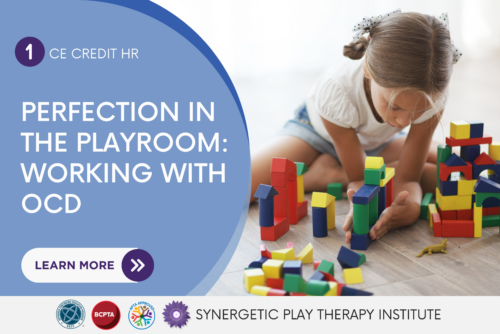 Supporting a child struggling with obsessive compulsions and perfectionism can be incredibly challenging as the desire to move the child out of their rigidity and rituals can overshadow the deeper issues and stressors driving the behaviors. In this course, you will gain an understanding of Obsessive Compulsive Disorder, the behavior of perfectionism, and how play therapy can support the integration of the underlying drivers of the behaviors so as not to intensify the inner struggle that is often experienced by these children as they attempt to stop, control and even deny the urges in their bodies.
Supporting a child struggling with obsessive compulsions and perfectionism can be incredibly challenging as the desire to move the child out of their rigidity and rituals can overshadow the deeper issues and stressors driving the behaviors. In this course, you will gain an understanding of Obsessive Compulsive Disorder, the behavior of perfectionism, and how play therapy can support the integration of the underlying drivers of the behaviors so as not to intensify the inner struggle that is often experienced by these children as they attempt to stop, control and even deny the urges in their bodies.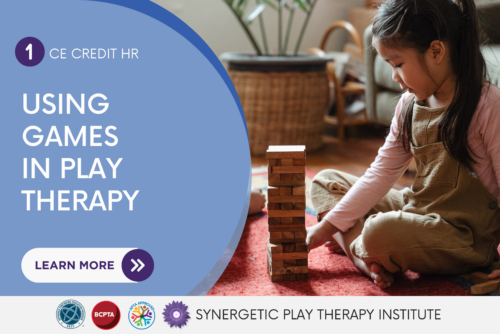 From a stroll through the Lollipop woods of Candyland to a fight over the Thimble in Monopoly, games are part of childhood. In the playroom, certain games are more commonly used than others. How do we use chess as a pawn in our therapeutic healing? How can we call on checkers to check on the child’s state of regulation? What does a game tell us about a child’s emotional world? This webinar explores these questions and more!
From a stroll through the Lollipop woods of Candyland to a fight over the Thimble in Monopoly, games are part of childhood. In the playroom, certain games are more commonly used than others. How do we use chess as a pawn in our therapeutic healing? How can we call on checkers to check on the child’s state of regulation? What does a game tell us about a child’s emotional world? This webinar explores these questions and more!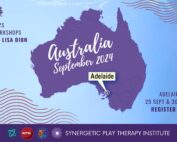
EARLY BIRD Registration Deadline is August 1st, Use coupon code "Adelaide50" at checkout for $50 USD off!
Final Registration Deadline is September 12th.
Lisa Dion is coming to Adelaide, Australia! Come join us for two unforgettable days of learning! During these two days, Lisa will teach a total of three topics adding up to 12 hours of transformative teaching! You will have the option to select to attend one or both workshop days to best fit your needs. Day 1 - "Playing Perfectly: A Play Therapist's Guide for Working with OCD" From perfectionism to anxiety to self-doubt, the world of a child struggling with OCD can be incredibly overwhelming. Come explore how to support these children in play therapy and discover how their need for perfection is in fact perfect! Supporting a child struggling with obsessive compulsions and perfectionism can be incredibly challenging as the desire to move the child out of their rigidity and rituals can overshadow the deeper issues and stressors driving the behaviors. Obsessive Compulsive Disorder is a complex disorder as the reasons behind the behaviors vary from managing anxiety to past traumas to focused energy inside of a child driving them towards their genius and that which is most meaningful. Due to the complexity, therapists often mis-label, mis-understand, and mis-guide these children in how to work with and understand their rituals and need for perfectionism. Without an understanding of this disorder and how play therapy is able to support the integration of the underlying drivers of the behaviors, play therapists can inadvertently intensify the inner struggle that is often experienced by these children as they attempt to stop, control and, even deny the urges in their bodies. Drawing from Synergetic Play Therapy® and interpersonal neurobiology, this workshop explores non-directive and directive play based interventions to help support play therapists on a path to understand the perfection in these children's perfection, while teaching the child how to do the same. Play therapists will take a deeper look at the regulatory function of the child’s behaviors that manage the internal conflicts and anxieties these children often carry. Through discussion and experiential exercises, play therapists will learn how to separate the underlying drivers from the wisdom of the rituals themselves. With this knowledge, play therapists will learn how to use themselves and many forms of play to help these children access an understanding of the greatest perfection that exists, the child just as they are! Day 2 Topic 1- "Developing Interoception: The Pre-req for Co-regulation and Self-Regulation in the Playroom" Helping children learn how to regulate is essential, but without first strengthening the child's interoceptive sense, regulation may not be successful. This experiential workshop offers various opportunities to explore how play can develop this fundamental part of the sensory system! As play therapists, there is an understanding that regulation and co-regulation are essential skills that must be developed in order to have successful relationships and manage emotions and are essential for trauma integration; however, what many play therapists may not fully understand is that there is a prerequisite that needs to be in place for regulation skills to be effective. What has been understood for years in the world of Occupational Therapy is now becoming a primary focus of education for play therapists. This important understanding is that the child’s interoceptive sense, the 8th sensory system that is responsible for letting the brain know how the body is doing, must be developed first before a child can successfully regulate and co-regulate. Without the development and strengthening of the interoceptive sense, a child may have all kinds of regulation knowledge and tools but will not be able to read their own body cues to know when to use them. Examples such as knowing when to use the bathroom, when to take a deep breath, when to ask for help, the ability to read non-verbal cues, knowing when emotions are feeling overwhelming, etc. all rely on interoception! This playful workshop is designed to help play therapists learn what the interoceptive sense is and how to use play to develop interoception in their child clients, setting the stage for successful regulation and co-regulation. Play therapists will have fun experientially exploring this fundamental part of the sensory system! Day 2 Topic 2 - "Mindfulness in Play Therapy" (with special guest Mindfulness Expert Peter Bliss!) Neuroscience is revealing that mindfulness is a key component for integration, so what is it, what is it not, and how do play therapists incorporate it into the playroom? These are important questions to consider! In this workshop, you will explore some of the neuroscience behind mindfulness as you learn how to cultivate it within yourself and within your child clients. You will also learn the importance of bringing mindfulness into the playroom as a way to avoid compassion fatigue, vicarious trauma, and burnout. This course is applicable to all play therapy theories! Please use the dropdown menu below to select your attendance option. You may choose to attend Day 1, Day 2, or both days for the full learning experience! *Please note that this is an entirely live, in-person event. Recordings of these workshops will not be made available.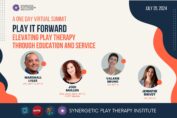
A One-Day Virtual Summit Empowering Therapists While Supporting Play Therapy Training Scholarships - JOIN US LIVE OR REGISTER FOR THE 7-DAY HOME STUDY OPTION!
"Play It Forward" is how therapists maximize their impact for clients, for themselves, and for their community of therapists around the world. Led by mental health professionals for mental health professionals, this educational summit offers online workshops on a variety of distinct topics by leaders in their fields and specialties. And, it provides another unique benefit: making professional development available to all clinicians! Hosted by the Synergetic Play Therapy Institute (SPTI), the Play It Forward Virtual Summit supports the Synergetic Play Therapy Foundation in offering scholarships for mental health professionals in need of financial assistance for training and education. Summit presenters donated their time and expertise as a vehicle for fundraising for our global community of therapists. *All proceeds from this virtual summit will be donated to the Synergetic Play Therapy Foundation to fund play therapy scholarships! The content of each course is diverse, yet there is one common vision - a future where play therapy education and training are more widely accessible and attainable for clinicians in need! Join us and invest in your professional growth while supporting this broader goal! You have the option to join this virtual summit for the Morning Session, the Afternoon Session, or for the Full Day of learning! Each "session" contains two courses on separate topics. (See the topic descriptions below to select the session(s) that most interests you!) Morning Session (Two Courses): Course #1 - Understanding the Intersection of Reflections and Reflective Functioning in Sandtray Therapy Presented by Marshall Lyles, LPC, LMFT-S, RPT-S Sandtray therapy prominently features the art of reflecting. In fact, it may be the therapy skill most associated with the craft. However, we can become so accustomed to the language of reflecting that we can lose contact with its intent. This workshop will look at the skill of reflecting through the lens of the attachment theory concept of reflective functioning. The examples given for honoring this intersection will feature the use of the sand tray. Course #2 - Playing by the Rules: Navigating Legal Processes for Play Therapists Presented by Val Bruno, LPC, RPT-S When play therapy intersects with the legal system, Play Therapists often find themselves in unfamiliar territory. Navigating legal processes can be daunting without proper guidance, leaving therapists feeling uncertain and ill-prepared to advocate for their clients effectively. Learn what you need to know to steer through the legal system with ease and confidence. You'll leave this presentation empowered to effectively advocate for your clients, ensuring their voices are heard and their needs are met. Afternoon Session (Two Courses): Course 1 - Play Therapy with Sexually Traumatized Children Presented by Dr. Jodi Mullen, LPC Children who have been sexually traumatized are often in need of our clinical services. Both directive and non-directive play therapy approaches provide these traumatized children with healing and the repair of losses associated with sexual trauma, such as innocence, trust, and appropriate boundaries. Develop your expertise and become a more effective advocate for your child clients with the knowledge and insight offered through this presentation. Learn about sexual development in children, the psychological markers of sexual trauma, and the special issues these children present in play therapy, including: consulting with non-offending parents, dealing with the powerful impact of countertransference, and setting limits. Course 2 - Creating an Affirming Play Therapy Space for Transgender and Gender-Diverse Children and Their Families Presented by Jennifer Shivey, LPC, RPT-S Transgender and gender-diverse children face unique challenges in navigating their identities and experiences. Their families also face unique challenges, but many are fearful of voicing them because of how others might perceive them. And well-meaning clinicians can unintentionally create harm when working with this population if they’re unaware of certain blind spots. Gain the knowledge, skills, and confidence you need to provide this much-needed support. This presentation will empower you to leverage play therapy as a dynamic and effective approach to support these children and their families in understanding and expressing themselves in a safe and affirming environment. For more information keep scrolling! Use the dropdown menu below to select your attendance option. You may select to attend the Morning Session courses, Afternoon Session courses, or Full Day to attend them all! *If you are attending live, select the "Live Event" option from the dropdown menu below. *If you are unable to attend live, select the "Home Study" option from the dropdown menu below. (Must be completed within 7 days following the live event)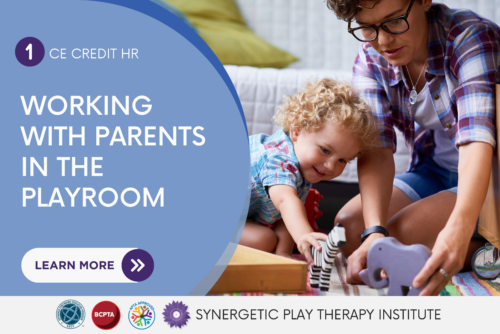 Parents are the most important allies of the play therapist. But forming this alliance requires time, understanding, and lots of communication. It also requires congruence, adaptability, and an appreciation of the parents’ authentic selves. Parents and play therapists are on the same team with one common goal: promote healing for a struggling child. This one-hour home study course explores this play therapy pact.
Parents are the most important allies of the play therapist. But forming this alliance requires time, understanding, and lots of communication. It also requires congruence, adaptability, and an appreciation of the parents’ authentic selves. Parents and play therapists are on the same team with one common goal: promote healing for a struggling child. This one-hour home study course explores this play therapy pact.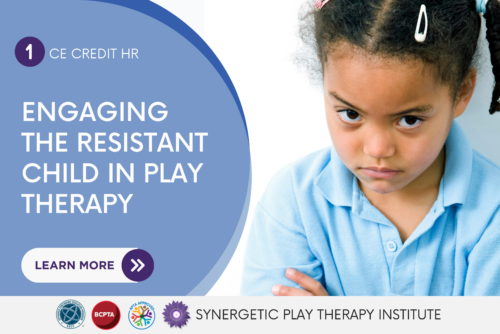 Every therapist has been there – in a session with a child who doesn’t want to come in the room, a child who doesn’t want to do the task, a child who only wants to avoid the issue. This course explores what to do when a child client’s language and behavior say “no.” Join us as we explore resistance, with a focus on differentiating resistance from avoidance and differentiating resistance from the dorsal collapse in the nervous system. Emotional flooding is explored as well.
Every therapist has been there – in a session with a child who doesn’t want to come in the room, a child who doesn’t want to do the task, a child who only wants to avoid the issue. This course explores what to do when a child client’s language and behavior say “no.” Join us as we explore resistance, with a focus on differentiating resistance from avoidance and differentiating resistance from the dorsal collapse in the nervous system. Emotional flooding is explored as well.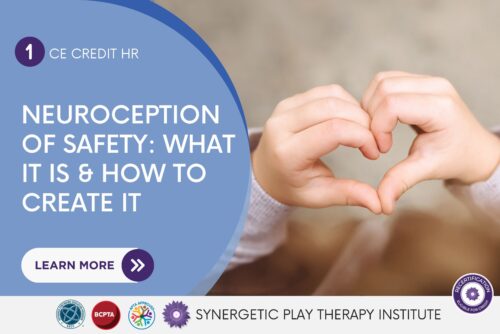 Helping a child heal involves helping them be themselves. One of the best ways to foster this type of environment is to cultivate safety. The therapist knowing the playroom is safe is not enough; the child must know it, too. This course explores what a neuroception of safety is and how to create it within the child and yourself.
Helping a child heal involves helping them be themselves. One of the best ways to foster this type of environment is to cultivate safety. The therapist knowing the playroom is safe is not enough; the child must know it, too. This course explores what a neuroception of safety is and how to create it within the child and yourself. Divorce. The “D” word. The end of the marital road. A happily ever after run amok. It’s something that often gets a bad rap, especially when we think of the children stuck in the middle. But divorce, while it can be devastating to some kids, can also be a relief for others. Children’s perceptions are not all the same. This course explores how to support children in play therapy when they are experiencing divorce and separation.
Divorce. The “D” word. The end of the marital road. A happily ever after run amok. It’s something that often gets a bad rap, especially when we think of the children stuck in the middle. But divorce, while it can be devastating to some kids, can also be a relief for others. Children’s perceptions are not all the same. This course explores how to support children in play therapy when they are experiencing divorce and separation.

